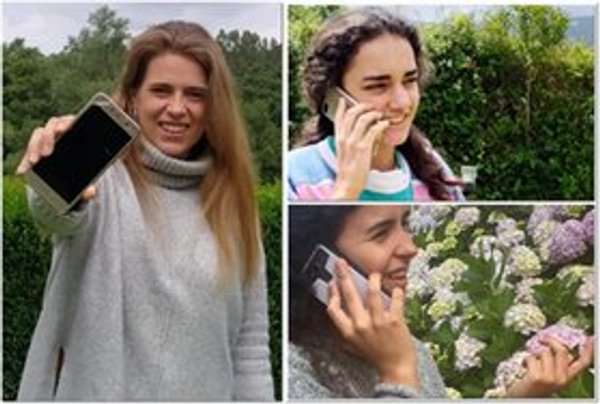When we entered the state of emergency, “helping others by staying at home” became the motto. But my conscience was still bothering me, above all on seeing the sad mages from Italy and Spain, not that far away from us. I felt the need to do what I could to help those who were suffering.
But… how could we help if we needed to stay at home? Without apparently being able to do very much, we tried to be creative. We decided to try to organize a group of young people willing to help alleviate the loneliness of the elderly, and even gave it a name: “#washing your hands is not enough.”
During the past four months, many people have not experienced a friendly embrace, a kind word or even an ordinary conversation. Ordinary things that were part of their daily life, like having coffee, visiting a neighbor, going to Mass, mornings at the market were no longer possible.
The idea was simple: to locate elderly and sick people, or simply people who were alone at home, and then to connect with them on a regular basis.
From an idea to reality, passing through an “instruction manual”
I spoke with some friends who began to gather names of possible volunteers for the project. And with the help of Milocas, a medical student, we put together a good group of volunteers, mostly university and professional women. Each volunteer committed herself to an elderly person whom she would call regularly during the quarantine.

The initiative will continue for as long as the state of emergency lasts. We are still receiving more names of people who would like to hear a friendly voice to converse with. We now have 41 volunteers from various cities in Portugal who are accompanying 45 elderly persons.
Our first intention was to match a volunteer with an elderly person in the same location, so that the volunteers could also visit them at home and bring them purchases, prescriptions, etc.
We had to act quickly, and since we did not know the volunteers personally or the persons they would be helping, we prepared an “instruction manual.” It contains advice for “breaking the ice,” how to overcome loneliness, some good practices, care to be taken and conversations to be avoided, since we wanted to be bearers of hope and good news!
Great friendships can arise!
To connect with a person you don’t know isn’t always easy. But by having friendly conversations and getting to know another person’s needs, telling anecdotes, accompanying them... great friendships can arise!
Teaching a person from another generation how to use recent technologies, for example, can be a big help for them. “My ‘granny’ was very worried about not knowing how to use Zoom, so today we are going to have a lesson on Zoom,” says Piedad, a volunteer from Braga. Marta tell us: “My phone conversation was marvelous. My ‘grandmother’ is 97 and says she loves to be able to talk with someone.”
Mariana, from Lisbon, who is accompanying a 95 year old bedridden woman, says that in her first telephone call it was difficult to build up any confidence, but later they talked for over an hour and will speak again soon.
Many photographs and stories have been exchanged, and friendships keep growing stronger. And the volunteers themselves have found their own lives enriched. Ana, who lives in Porto, says: “Today one of my ‘grannies’ really brightened up the day for me!”
Not all the people we help are elderly. Some are sick people who are also suffering from loneliness. Teresa, in Viseu, tells us that the woman she is talking with “is very cheerful, despite having suffered from cancer for over 20 years. We have even signed ourselves up on social media.”
We have all learned a lot. Many people leading seemingly ordinary lives have fantastic stories to tell that they want to share with others. Above all, we have learned a lot about friendship, and that even friendship developed over the phone, with big age differences, is a treasure, and the best medicine to overcome bad times.
There are many ways of looking at Covid-19, but perhaps the best way is to see it as a great lesson that forces us to focus on what is essential, on what really matters.
Normality is something extraordinary. And when normality failed us, we understood how important the little things in life are, a trip to the cafe, a hug, a good conversation with a new friend.
